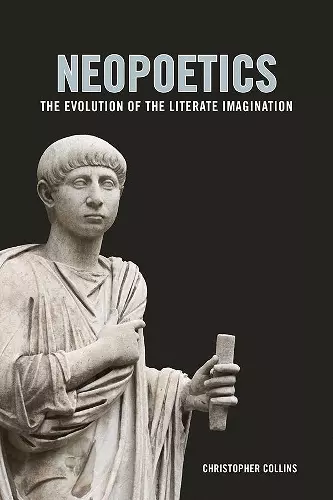Neopoetics
The Evolution of the Literate Imagination
Format:Hardback
Publisher:Columbia University Press
Published:13th Dec '16
Currently unavailable, and unfortunately no date known when it will be back

The quest to understand the evolution of the literary mind has become a fertile field of inquiry and speculation for scholars across literary studies and cognitive science. In Paleopoetics, Christopher Collins's acclaimed earlier title, he described how language emerged both as a communicative tool and as a means of fashioning other communicative tools-stories, songs, and rituals. In Neopoetics, Collins turns his attention to the cognitive evolution of the writing-ready brain. Further integrating neuroscience into the popular field of cognitive poetics, he adds empirical depth to our study of literary texts and verbal imagination and offers a whole new way to look at reading, writing, and creative expression. Collins begins Neopoetics with the early use of visual signs, first as reminders of narrative episodes and then as conventional symbols representing actual speech sounds. Next he examines the implications of written texts for the play of the auditory and visual imagination. To exemplify this long transition from oral to literate artistry, Collins examines a wide array of classical texts-from Homer and Hesiod to Plato and Aristotle and from the lyric innovations of Augustan Rome to the inner dialogues of St. Augustine. In this work of "big history," Collins demonstrates how biological and cultural evolution collaborated to shape both literature and the brain we use to read it.
Professor Collins has shown, with his unique combination of interests, just how complex and unpredictably intricate the cognitive web of human culture has become. Of course, this is not the last word on the subject of how culture shapes and modifies our collective cognitive process; we have just begun the task of mapping out the territory to be explored. But exploration is inherently exciting in itself, and this book has significantly widened the scope of the project. -- Merlin Donald, author of "Origins of the Modern Mind" Neopoetics brings ideas from ancient Greece and modern literary and psychological theory together in describing the "writing-ready" brain. It is a work of impressive scholarship, though the literary extracts and occasionally anecdotal style make the book a pleasure to read. I think it will make a distinctive mark in fields of human understanding, including history, psychology, anthropology, literary criticism, musicology. -- Michael Corballis, author of From Hand to Mouth: The Origins of Language Christopher Collins weaves the strands of cognitive poetics - neuroscience, cognitive psychology, anthropology, linguistics and semiotics - into a masterful work of scholarship on literacy, language, memory and the mind that itself reads as beautifully as a novel. This book calls out to be picked up and read carefully by anyone interested in how writing transformed the traditionally oral cultures of ancient Greece and Rome into literate and literary ones, and indeed helped define our own cultural evolution as human beings -- William Short, University of Texas, San Antonio The word poetics is rooted in the Greek poiein, to 'build' or 'create.' In his 2013 book, Paleopoetics, Christopher Collins assessed how evolution gave rise to the "language-ready" brain and its ability to create tools that extends our thoughts. Neopoetics carries his story forward to illuminate how writing has transformed the way that language supports 'mindsharing,' performance and narrative. His exposition fruitfully augments the tools of literary analysis with well-judged perspectives from cognitive neuroscience in ways that extend to dance, music and emotion. -- Michael Arbib, University of Southern California Collins breathes new life into the constructionist premise that language shapes how humans think. Using the literary traditions of ancient Greece and Rome to examine the constraints that oral and written media, respectively, impose on narrative representation, Neopoetics suggests new ways of thinking about the cognitive mechanisms that shape cultural transmission. -- Michelle Scalise Sugiyama, University of Oregon Recommended. -- A. Kind CHOICE
ISBN: 9780231176866
Dimensions: unknown
Weight: unknown
344 pages